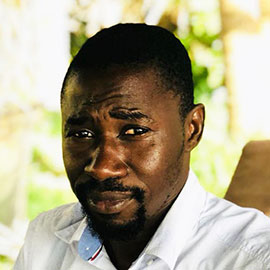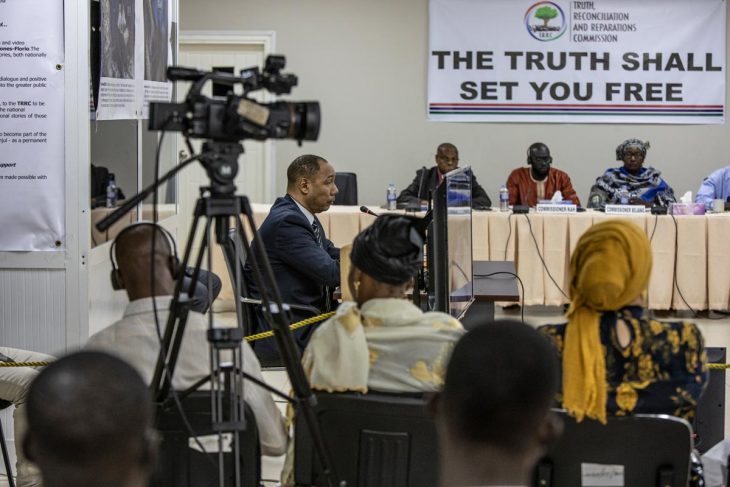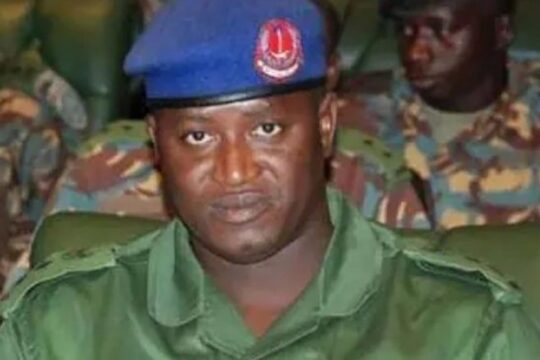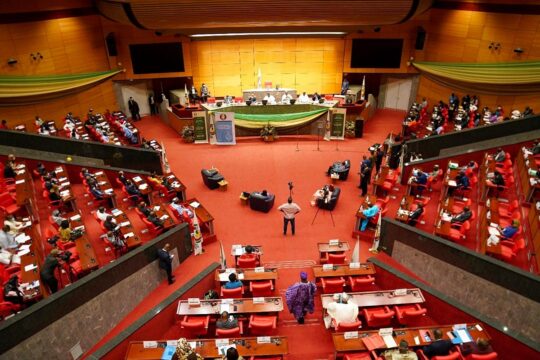Since the appearance of former junta member Sanna Sabally last April, Gambia’s Truth, Reconciliation and Reparations Commission (TRRC) has never had such a following on its live broadcast. On October 16 and 17 appeared Edward Singhateh, one of the primary planners of the July 1994 coup that brought Yahya Jammeh to power, and a former Defense minister in the military junta.
The 1994 military coup in The Gambia was led by five people. Yahya Jammeh is in exile in Equatorial Guinea. Sadibu Hydara is dead, reportedly beaten to death by his former comrades. The three others – Sanna Sabally, Edward Singhateh and Yankuba Touray – have now appeared before the TRRC, a remarkable achievement for the Commission. (Touray, who refused to answer the questions, was charged of murder and put in jail.)
“Take no prisoners”
On November 11, 1994, the newly installed Military Council was confronted with a perceived threat of a counter-coup. It was claimed that a section of the army led by Lieutenant Basiru Barrow and Lieutenant Abdoulie Faal was planning to depose and kill the Military Council’s leaders and their families.
Testimonies before the TRRC suggest that the coup allegedly planned by Barrow and Faal may was based on conjecture and rumor rather than real evidence. Nevertheless, the young junta leaders decided something should be done about the threat. According to Singhateh, they met at the State House and agreed on a preemptive strike. “Generally, the order was to preemptively go and attack the barracks,” said Singhateh. According to some evidence before the Commission, there was another meeting between the Council Members on the issue. While saying that there was a consensus among them to go and crush the coup, Singhateh denied there was such meeting.
The offensive on the country’s biggest military encampments was led by Sanna Sabally, said Singhateh, corroborating the testimony of Sabally himself before the Truth Commission. “The order that President Jammeh gave to Sanna [Sabally] was: ‘Take no prisoners’,” said Singhateh. He denied that the executions that were to follow had been a collective decision made by the Council.
“I did not shoot”
The first place the soldiers attacked was the Yundum Barracks, a military encampment about an hour drive from Banjul, the capital city. They captured a number of soldiers, including Abdoulie “Dot” Faal and Basiru Barrow. Then they launched another offensive on the Fajara Barracks, another military camp outside Banjul.
They took both barracks without any casualty on their side, confirmed Singhateh. There, they lined up prisoners and executed Faal and Barrow. Singhateh admitted criminal liability for their death but he said he did not fire a shot himself, contrary to what Sabally and other witnessed had said. Earlier on, Singhateh had also denied participation in two major torture allegations against him. For the TRRC lead counsel Essa Faal, this was not being truthful.
“Isn’t it convenient that you are always there but you never did it?” asked Essa Faal.
“Sir, I did not shoot,” replied Singhateh.
“You see, what I am doing is to show your strategy: ‘Oh I was there, my people participated but I did not.’ You are trying to seal yourself from responsibility.”
“As a marksman, Sir, I still hold a record of sharp shooting in the GNA [Gambia National Army]. If I wanted to kill, none of the people would have escaped. They were running in a straight line.”
“It was wrong and I am sorry”
Previous testimonies did confirm that several people escaped from the executions at Fajara barracks. Two were killed there. After these two initial executions, Singhateh said the soldiers returned to State House to brief Jammeh. At that time, there were a number of detainees at the Yundum Barracks, including Lt Buba Jammeh, Lt Abdoulie Bah, Lt Bakary Manneh, Cadet Amadou Sillah and Lt. Gibril Saye. According to Singhateh, Jammeh asked his comrades to go back and execute the rest of them.
“Jammeh told Sanna [Sabally] that they [the alleged coup plotters] had sympathisers in the army [who] could continue the mission if freed. He ordered us to go back and finish the job. We did,” testified Singhateh. The soldiers had their hands tied behind them and taken to a forest near Yundum Barracks. That is where they were executed, according to Singhateh and several other witnesses. He said the second execution was a unanimous decision among the Council Members. However, he said he did not discharge a bullet himself.
“At the Yundum Barracks, Sanna Sabally gave an order for us to shoot and I gave an order for my men to shoot. I did order the killing of Fafa Nyang. I would like to apologize for the death of Fafa Nyang. But not just Fafa Nyang. Also, I profusely apologize to the families of “Dot” Faal and Basiru Barrow. I cannot imagine how their families would have felt. What we did was illegal, it was wrong and I am sorry,” pleaded Singhateh. “What happened was despicable. We were angry, felt threatened but that is not an excuse.”
Singhateh also admitted to ordering the killings of Sergeant Basiru Camara and E.M. Ceesay.
A total of eleven soldiers were executed on that fateful day. “They [the soldiers] were killed and it should not have happened. It was illegal. I seek the forgiveness of their families even though they have been hurt to an extent inconceivable,” said Singhateh. He also pleaded on behalf of people who acted on his orders. “The soldiers who were ordered to shoot, I would like the society to kindly look upon them. They would not have shot if the Council did not order them to do it,” the witness said.
Denying torture
These admissions led to slightly better relations between the witness and the TRRC lead counsel. “This is the spirit of this Commission,” Essa Faal said, “to own up to what you have done and apologize.”
Until his appearance, Singhateh did not have a good reputation. A trained lawyer and former vice-president of the Ecowas Commission, he has been described by many of his colleagues as a very brutal man. A onetime spokesperson of the military junta, Alagie Kanteh, described him as a “sadist” who “enjoys inflicting pain on people”. Several other former and currently serving top military officers made similar statements about him.
Indeed Singhateh does not just face allegations of murder. He is also accused of torturing a number of people. Following the coup in 1994, several individuals, including former ministers and security officers, were arrested and tortured. Singhateh’s testimony before the TRRC said little about this. He admitted that he witnessed the mock execution of former minister of Agriculture Omar Jallow but he denied participation in the act, even though Jallow had implicated Singhateh in his torture when he testified last January.
Essa Faal, once again, would not take this easily.
“Apart from denying participation in the arrest, you deny beating Captain Mamat Cham [current commander of the Gambian National Army]”, snapped Essa Faal.
“That is correct, Sir,” replied Singhateh.
“Even though Mamat Cham did say you assaulted him.”
“That is correct.”
“Even though there are three other witnesses who confirmed that you assaulted Mamat Cham.”
“That is correct.”
“So, from the statement of all of these four people, all of them confirming that you assaulted Mamat Cham, you want the Commission to believe your side of the story which is unsupported?”
“What I can do is offer my side. What the Commission takes is entirely up to the Commission.”
“I put it to you that your side of the story is false. It is mainly intended to seal yourself from responsibility in view of clear evidence. What do you say to that?”
“I say that you are wrong, Sir.”
Edward Singhateh generally appeared collected and calm, even though he occasionally raised his voice, rubbed a pen between his fingers, dropped it and held his glasses. “I feel responsible for installing Jammeh and I feel responsible for sustaining him in power. We campaigned for his election time and time again and I feel responsible. Anyone he hurt, I bear that burden,” he said.
Edward Singhateh’s testimony continues on September 20. He is the first witness to remain three days on the stand before the TRRC.






